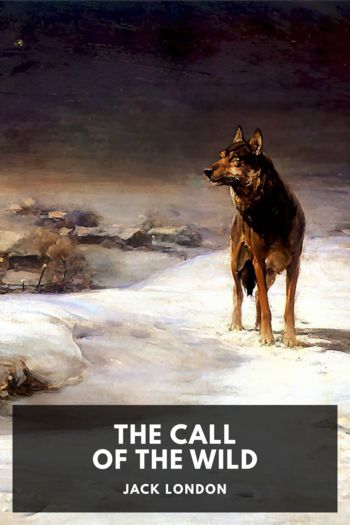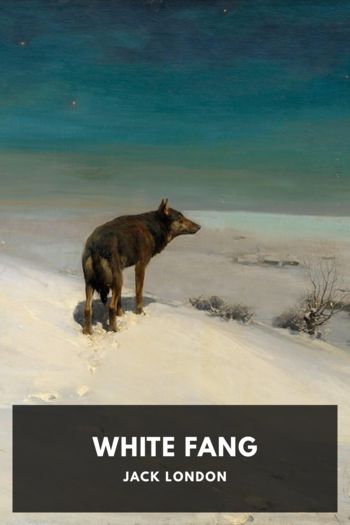The Call of the Wild by Jack London (world best books to read TXT) 📕

Description
Jack London spent nearly a year in Alaska and the Klondike, mining for gold and braving the Alaskan winter. There he was inspired to write what would become The Call of the Wild, one of his most famous novels. The Call of the Wild tells the tale of a domesticated dog stolen from his California family and sold to sledders in Alaska. As he adapts to the harsh and wild environment, he slowly sheds domestication and returns to his primal roots.
The Call of the Wild was London’s first major success, ensuring he’d have a readership for his future writing and paving the way for him to become one of the first writers to amass a fortune from just his fiction.
Read free book «The Call of the Wild by Jack London (world best books to read TXT) 📕» - read online or download for free at americanlibrarybooks.com
- Author: Jack London
Read book online «The Call of the Wild by Jack London (world best books to read TXT) 📕». Author - Jack London
With the last remnant of his strength he managed to stagger along behind till the train made another stop, when he floundered past the sleds to his own, where he stood alongside Sol-leks. His driver lingered a moment to get a light for his pipe from the man behind. Then he returned and started his dogs. They swung out on the trail with remarkable lack of exertion, turned their heads uneasily, and stopped in surprise. The driver was surprised, too; the sled had not moved. He called his comrades to witness the sight. Dave had bitten through both of Sol-leks’s traces, and was standing directly in front of the sled in his proper place.
He pleaded with his eyes to remain there. The driver was perplexed. His comrades talked of how a dog could break its heart through being denied the work that killed it, and recalled instances they had known, where dogs, too old for the toil, or injured, had died because they were cut out of the traces. Also, they held it a mercy, since Dave was to die anyway, that he should die in the traces, heart-easy and content. So he was harnessed in again, and proudly he pulled as of old, though more than once he cried out involuntarily from the bite of his inward hurt. Several times he fell down and was dragged in the traces, and once the sled ran upon him so that he limped thereafter in one of his hind legs.
But he held out till camp was reached, when his driver made a place for him by the fire. Morning found him too weak to travel. At harness-up time he tried to crawl to his driver. By convulsive efforts he got on his feet, staggered, and fell. Then he wormed his way forward slowly toward where the harnesses were being put on his mates. He would advance his forelegs and drag up his body with a sort of hitching movement, when he would advance his forelegs and hitch ahead again for a few more inches. His strength left him, and the last his mates saw of him he lay gasping in the snow and yearning toward them. But they could hear him mournfully howling till they passed out of sight behind a belt of river timber.
Here the train was halted. The Scotch halfbreed slowly retraced his steps to the camp they had left. The men ceased talking. A revolver-shot rang out. The man came back hurriedly. The whips snapped, the bells tinkled merrily, the sleds churned along the trail; but Buck knew, and every dog knew, what had taken place behind the belt of river trees.
V The Toil of Trace and TrailThirty days from the time it left Dawson, the Salt Water Mail, with Buck and his mates at the fore, arrived at Skaguay. They were in a wretched state, worn out and worn down. Buck’s one hundred and forty pounds had dwindled to one hundred and fifteen. The rest of his mates, though lighter dogs, had relatively lost more weight than he. Pike, the malingerer, who, in his lifetime of deceit, had often successfully feigned a hurt leg, was now limping in earnest. Sol-leks was limping, and Dub was suffering from a wrenched shoulder-blade.
They were all terribly footsore. No spring or rebound was left in them. Their feet fell heavily on the trail, jarring their bodies and doubling the fatigue of a day’s travel. There was nothing the matter with them except that they were dead tired. It was not the dead-tiredness that comes through brief and excessive effort, from which recovery is a matter of hours; but it was the dead-tiredness that comes through the slow and prolonged strength drainage of months of toil. There was no power of recuperation left, no reserve strength to call upon. It had been all used, the last least bit of it. Every muscle, every fibre, every cell, was tired, dead tired. And there was reason for it. In less than five months they had travelled twenty-five hundred miles, during the last eighteen hundred of which they had had but five days’ rest. When they arrived at Skaguay they were apparently on their last legs. They could barely keep the traces taut, and on the down grades just managed to keep out of the way of the sled.
“Mush on, poor sore feets,” the driver encouraged them as they tottered down the main street of Skaguay. “Dis is de las’. Den we get one long res’. Eh? For sure. One bully long res’.”
The drivers confidently expected a long stopover. Themselves, they had covered twelve hundred miles with two days’ rest, and in the nature of reason and common justice they deserved an interval of loafing. But so many were the men who had rushed into the Klondike, and so many were the sweethearts, wives, and kin that had not rushed in, that the congested mail was taking on Alpine proportions; also, there were official orders. Fresh batches of Hudson Bay dogs were to take the places of those worthless for the trail. The worthless ones were to be got rid of, and, since dogs count for little against dollars, they were to be sold.
Three days passed, by which time Buck and his mates found how really tired and weak they were. Then, on the morning of the fourth day, two men





Comments (0)